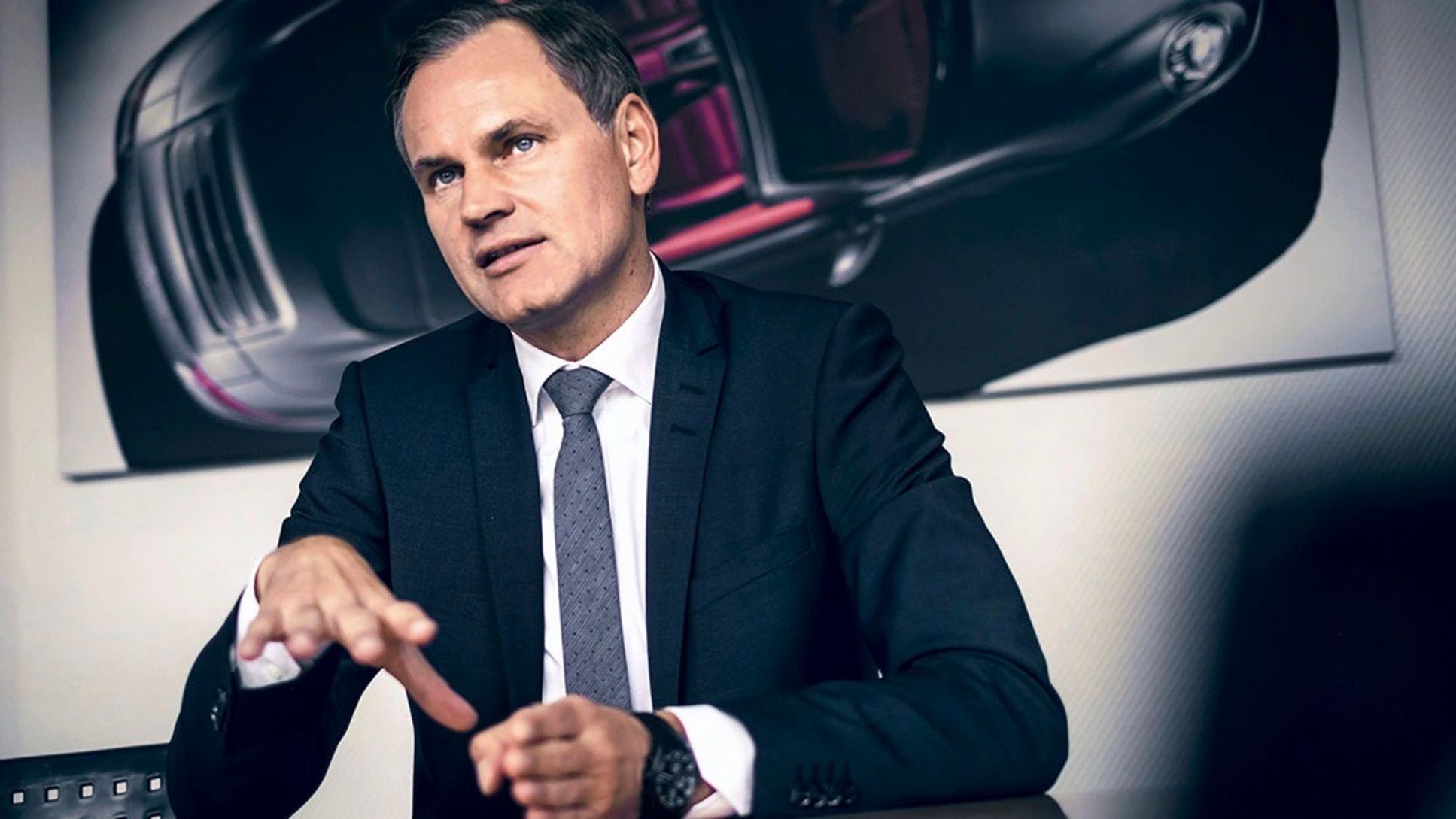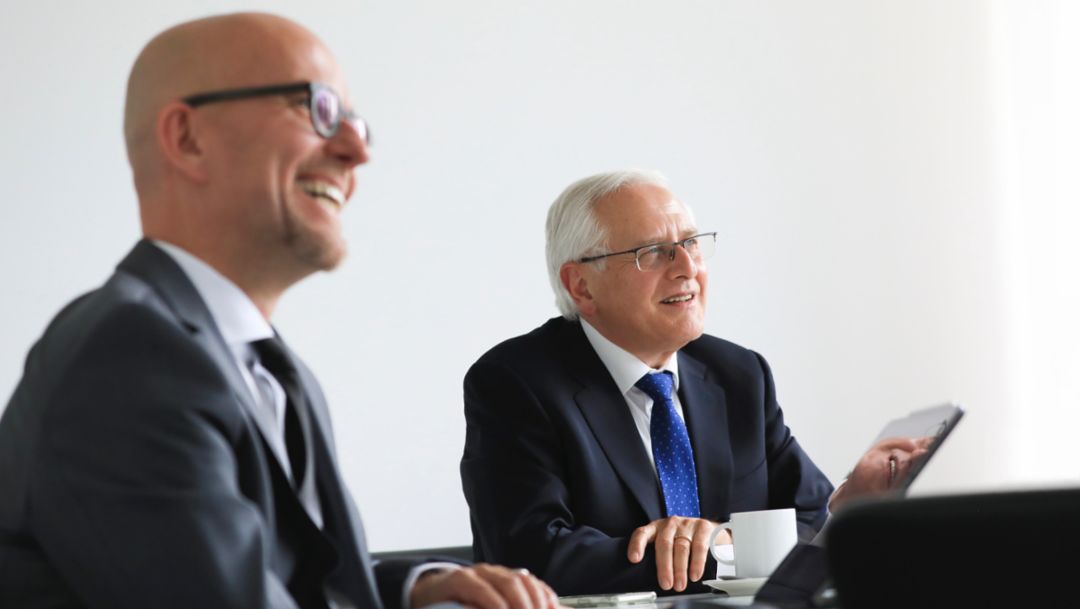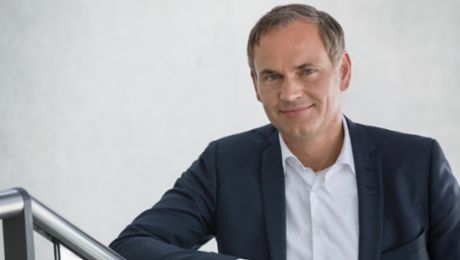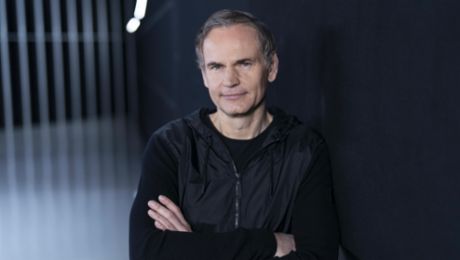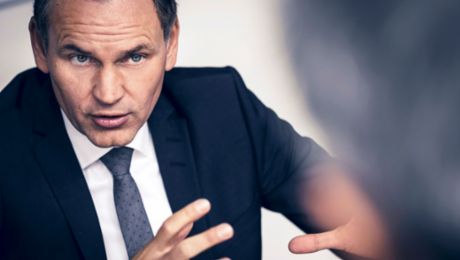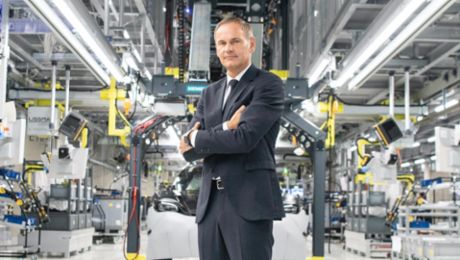Porsche has seen a 15 percent drop in sales for this year. How have you come through the crisis so far?
Oliver Blume: The coronavirus crisis is a massive challenge for us. Nevertheless, we have been resilient and are on a comparatively steady course. Our Porsche Centres in China were closed at the beginning of the year. With a time delay, they were also closed in Europe and the United States from March. That is why deliveries were down in these regions by high double-digit percentages for a certain time. We are in the same situation as all the other car manufacturers. We are now helped by the fact that we have invested extensively in new products and innovations. The most recent examples are the new 911, the Cayenne Coupé or the Taycan, our first purely electric sports car. Our brand has become even more emotive in recent years. This has given us some tailwind.
Were there any specific changes during lockdown?
Blume: Yes, there were a few. It has been our aim to manage the crisis systematically and responsibly. We responded early on and immediately set up a crisis task force - as soon as it became clear coronavirus was spreading in China. Meetings were held daily, mainly to discuss how to organise our business in the best possible way. In all aspects. With the customers in mind, from the products to the processes. From day one, our motto has been to actively use this time as an opportunity – so that we can emerge even stronger at the end.
"What makes Porsche what it is, what is really important to us. A crisis shows very quickly how stable and flexible a company’s structure is." Oliver Blume
How do you do that?
Blume: We focus on the basics. What makes Porsche what it is, what is really important to us. A crisis shows very quickly how stable and flexible a company’s structure is. We have worked intensively on our cost structure and have therefore been able to further improve our break-even. We have also made greater use of the opportunities provided by digital media. In communication, collaboration and also digital experiences for our customers. We want to benefit from all these experiences in future in a sustainable way.
Does that mean that you will be able to achieve a return on sales of close to 20 percent thanks to this coronavirus boost?
Blume: No, not even Porsche can manage that. We have always said that 15 percent in return on sales is an ambitious benchmark. We have exceeded that in recent years. This year, the effects of coronavirus mean that the 15 percent will not be achievable, that much is clear already. However, we aim to quickly return to our target level of return in the short term. Our electrified models such as the Taycan will also help us to achieve this. I believe that, after the crisis, people will live their lives with greater awareness, creating real momentum for e-mobility.
Can a premium brand like Porsche survive the crisis better than a high-volume brand?
Blume: Not necessarily. It is easy to say that our attractive sports cars always sell well - because they help our customers fulfil their dreams. But our customers include entrepreneurs facing economic problems, which means they might put off buying a new car for now. On the other hand, high-volume brands are seeing a decline in fleet business, for example for company cars or car rentals. There are pros and cons in all areas. The decisive factors are courageous decision-making, cohesive team work and the correct strategic direction for the future.
How does this apply specifically to Porsche?
Blume: It means that we will take care of the needs of every individual customer. Our strong brand will help us to do that: people trust in strong brands, particularly in times of crisis, because they are looking for stability and values, also in cars. Look at the 911 – a sports car that radiates emotive appeal; or the Taycan which, like no other car on the planet, combines the future as well as a heritage steeped in tradition.
Can you detect regional differences? How are things looking in China, what about the USA?
Blume: We very clearly felt the effects of the setback at the beginning of the year in China. The market has rallied somewhat in the meantime so that we are almost back to the levels of 2019. Things are looking pretty good in Japan and South Korea as well. The development in important Asian markets is positive.
How are things looking in Europe?
Blume: Coronavirus hit some markets quite hard. Great Britain, Spain, Italy and France, to name a few examples. These countries will need time to get back to a comparatively normal level. Germany needs to recover as well.
You haven’t mentioned the United States yet.
Blume: The trend is more volatile there. The sales figures depend greatly on the individual regions and how effective the efforts are to control the pandemic. Porsche has a strong presence in the United States on the East and West coasts.
The lockdown in New York must have hit you hard.
Blume: New York is a strong sales region for us. The lockdown almost brought our business to a standstill. We are greatly helped by a strong fan community in the US. Our brand is very strong there, the Americans love Porsche – and have done so for decades now. That is extremely helpful in a crisis like this. There are also a few regions in the States which are not affected as much. Above all else, we have the advantage at Porsche that we have a good set-up all over the world. This makes it easier to compensate for regional fluctuations.
Are there any changes at Porsche as a result of the severe crisis situation?
Blume: It is important to have a positive fundamental attitude. With this in mind, we have reassessed everything. Every single euro of possible expenditure has been questioned: do we really need that? This approach has strengthened our liquidity position. Moreover, we are have a strong financial base thanks to our performance in recent years.
Have you cancelled new models?
Blume: Absolutely not. Our aim from the very beginning was to not cancel a single model. Instead, we considered what could perhaps be delayed a little. In other words, changing the sequence. There will be some adaptations, but nothing that will be especially noticeable on the market. These interventions were only part of an extensive programme in the last few months. However, investments in the future are also especially important to us at this time. We are budgeting 15 billion euros just for new technologies in the next five years.
"It is important to have a positive fundamental attitude. With this in mind, we have reassessed everything." Oliver Blume
How was all this managed internally within the company?
Blume: We acted with full transparency, followed a clear strategy, initiated steps systematically and closely involved the team. We were able to give our workforce the confidence that we would steer the company safely through the crisis. Our priority was good health and a safe workplace. At the same time, it was clear to everyone that each person had to make their own very personal contribution. Success is team work.
What role does internal communication play in this?
Blume: A big role. I produced weekly video messages throughout the acute crisis phase in which I described the current situation. In addition, we provided information daily via the intranet. Communication was and remains a top priority. Everyone in the company must be up-to-date. Information, orientation and transparency are decisive. I personally was on site every day. I think this sends an important message to the team. The captain of a ship must stay on board at all times.
Asking again from a customer‘s point of view: will there be delays in sales?
Blume: Yes. Unfortunately, that cannot be avoided. We cannot get past the fact that the entire production was shut down for six weeks. Our European supply network was particularly affected. Of course, we can really feel the impact of those six weeks. There will be some delays in deadlines which we want to keep as short as possible. We are now trying to catch up with the long interruption in production. Our factories are working at full speed again.
Will you cancel the plant holidays?
Blume: No. We need the break to prepare the start of production for new models. We are not going to change that now. This preparation time is necessary for technical reasons. I also think it is important to give the team a well-deserved break to recharge their batteries on holiday.
"Our factories are working at full speed again." Oliver Blume
Will Porsche emerge from the coronavirus crisis relatively unscathed?
Blume: Well, I would not say unscathed. Coronavirus hit us hard, just like any other company. We have gained experience in the crisis which we want to carry into the future. Digitalisation has been given an enormous boost. Our meeting culture has become more efficient. I even believe that the crisis will also have a lasting positive effect on us regarding human and organisational interaction. I always think in terms of opportunities.
Is there anything else you feel is important which has emerged from the coronavirus crisis?
Blume: From day one, we did not just have Porsche as a commercial enterprise in mind, but also our role and responsibility in society. What can we do for people who find themselves in a state of need. How can we support the countries in which we are represented. This started with a needs assessment to see where help was actually needed. This resulted in the ‘Porsche helps’ programme. For example, we supported the states of Baden-Württemberg and Saxony in the organisation of crisis task forces, providing project managers and IT experts.
Are there any other examples?
Blume: The federal states I mentioned do not have any procurement organisations to obtain urgently needed protective equipment. Our worldwide organisation took over that job. We are talking about items in the upper three-digit million range. In addition, we extensively increased our charity donations all over the world. We helped food banks with food supplies in Germany, for example. And we provided support to numerous hospitals and charitable organisations in the form of donations. On a personal level as well. Many Porsche colleagues helped on a voluntary basis. The fundamental attitude is what is important to us: we are ready to help people in times of crisis as well.
One last question: You are also on the Executive Board for the Volkswagen Group. How do you see the recent conflicts in Wolfsburg concerning the Chairman of the Executive Board, Mr Diess?
Blume: We have had some challenging months caused by coronavirus. At the same time, we are in the middle of a great industrial transformation involving electrification and digitalisation. Of course, there will be points of friction in this process, even in the Volkswagen Group. I am counting on the company’s ability to fall back on its strengths, of which there are many. The better the entire team interact, the better we will be at mastering these challenges together.
Mr Blume, thank you for this conversation.
Info
This text was first published in Handelsblatt.
The interview was conducted by Stefan Menzel.
